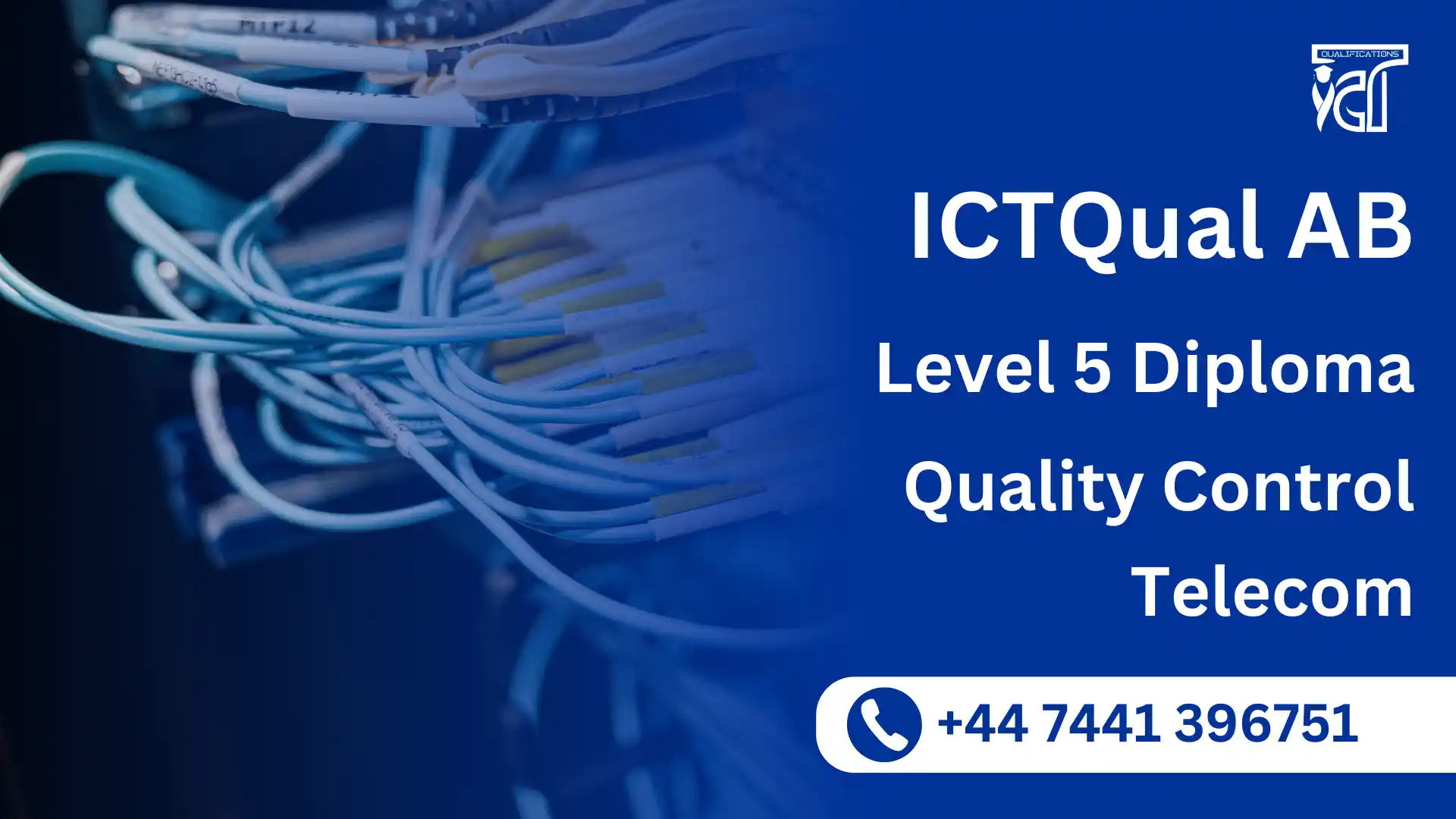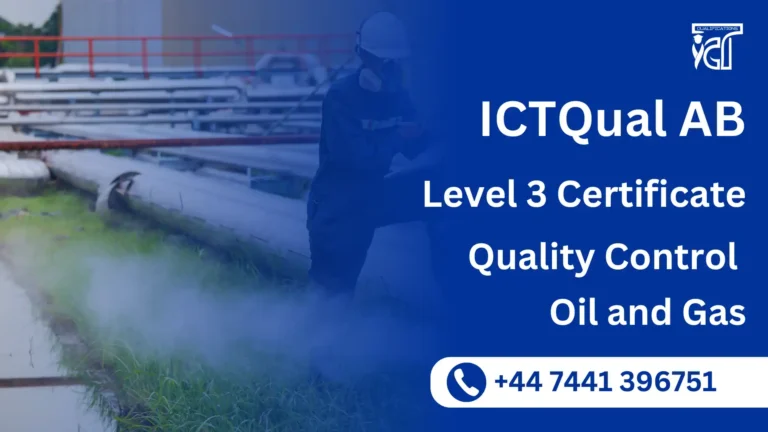The ICTQual AB Level 5 Diploma in Quality Control Telecom is an advanced qualification designed for professionals seeking to specialize in high-level quality assurance and inspection practices within the telecommunications industry. This diploma provides comprehensive training on telecom quality management systems, regulatory compliance, signal performance analysis, equipment auditing, and the implementation of international telecom standards.
Learners will gain in-depth knowledge of advanced quality control methodologies, root cause analysis, quality planning, and continuous improvement strategies tailored to telecom networks and infrastructure. The course also emphasizes leadership in quality operations, risk management, and the ability to oversee complex projects and inspection teams.
Ideal for experienced technicians, quality supervisors, and telecom professionals aiming to move into senior or specialist roles, this diploma prepares learners to lead quality control initiatives in mobile, fiber, broadband, and satellite communication systems. It also offers a strong foundation for further academic or professional advancement in telecom engineering and quality management.
ICTQual AB Level 5 Diploma in Quality Control Telecom
This qualification, the ICTQual AB Level 5 Diploma in Quality Control Telecom, consists of 10 mandatory units.
- Strategic Quality Management for Telecommunications Projects
- Advanced Telecom Systems Diagnostics and Calibration
- Network Quality and Service Assurance Techniques
- Regulatory Compliance and International Telecom Law
- Telecom Risk Assessment and Quality Control Planning
- Supply Chain Quality Management in Telecom Projects
- Sustainable Practices and Environmental Standards in Telecom
- Leadership in Quality Assurance and Telecom Team Supervision
- Innovation and Quality Improvement in Telecom Technologies
- Technical Reporting and Quality Data Analysis
Here are the learning outcomes for each study unit:
Strategic Quality Management for Telecommunications Projects
- Develop and implement quality strategies aligned with telecom project objectives
- Evaluate quality performance metrics for large-scale telecommunications projects
- Integrate continuous improvement models within project planning and delivery
- Align strategic quality initiatives with organisational and regulatory expectations
Advanced Telecom Systems Diagnostics and Calibration
- Apply advanced diagnostic techniques to complex telecom systems and networks
- Perform precise calibration of telecom equipment to maintain service quality
- Interpret diagnostic data to identify system inefficiencies and faults
- Recommend corrective actions based on analysis of technical diagnostics
Network Quality and Service Assurance Techniques
- Monitor and assess network performance using service assurance tools
- Identify service degradation issues through real-time and post-event analysis
- Implement processes to ensure service reliability, availability, and efficiency
- Use quality metrics to maintain customer experience standards in telecom services
Regulatory Compliance and International Telecom Law
- Understand legal frameworks governing telecom operations across international markets
- Interpret telecom regulatory requirements and apply them to quality processes
- Ensure organisational compliance with data protection, licensing, and safety standards
- Prepare documentation and reports for audits and regulatory submissions
Telecom Risk Assessment and Quality Control Planning
- Conduct comprehensive risk assessments for telecom infrastructure and services
- Develop quality control plans to mitigate identified risks
- Apply risk-based thinking to prioritise inspection and quality assurance efforts
- Integrate risk management into operational and strategic quality frameworks
Supply Chain Quality Management in Telecom Projects
- Evaluate supplier quality standards and performance in telecom projects
- Implement quality assurance processes across procurement and supply chains
- Identify non-conformances in supplied equipment and services
- Establish effective communication and collaboration with suppliers to meet quality objectives
Sustainable Practices and Environmental Standards in Telecom
- Apply environmental regulations and sustainability principles to telecom operations
- Evaluate the environmental impact of telecom infrastructure and equipment
- Implement practices to reduce waste and improve energy efficiency
- Promote a culture of environmental responsibility within quality control processes
Leadership in Quality Assurance and Telecom Team Supervision
- Lead and manage quality assurance teams within telecom projects
- Allocate resources and delegate responsibilities to meet quality objectives
- Motivate and support team members through effective communication and supervision
- Resolve conflicts and drive performance in quality-driven teams
Innovation and Quality Improvement in Telecom Technologies
- Identify opportunities for innovation in telecom quality processes
- Apply quality improvement methodologies such as Six Sigma or Lean principles
- Evaluate the effectiveness of new technologies on service quality and efficiency
- Lead change initiatives that support continuous quality advancement
Technical Reporting and Quality Data Analysis
- Produce comprehensive quality reports using industry-standard formats
- Analyse quality data to identify trends, issues, and improvement opportunities
- Present technical findings to stakeholders with clarity and accuracy
- Use data visualisation tools to support quality decision-making processes
Benefits of the ICTQual AB Level 5 Diploma in Quality Control Telecom
Advanced Quality Assurance Skills
Master high-level telecom quality control practices, including signal integrity analysis, regulatory compliance, and advanced fault diagnostics.
Career Advancement Opportunities
Prepare for senior roles such as Telecom Quality Supervisor, Network QA Specialist, or Quality Compliance Manager in telecom operations.
Leadership and Project Oversight
Develop the ability to lead quality teams, manage large-scale inspection processes, and implement quality assurance frameworks across complex telecom networks.
Industry Recognition
Earn a widely respected qualification aligned with international telecom standards, enhancing your professional credibility and market value.
Improved Risk and Compliance Management
Learn to identify and mitigate risks, enforce telecom regulations, and ensure service reliability and safety across telecom projects.
Real-World Application
Apply advanced concepts to real telecom environments, including mobile, broadband, fiber optics, and satellite communication systems.
Pathway to Further Qualifications
Use this diploma as a stepping stone toward higher-level academic degrees or certifications in telecom engineering, quality management, or leadership.
Enhanced Problem-Solving and Analytical Skills
Gain expertise in root cause analysis, preventive actions, and continuous improvement, enabling you to maintain quality and optimize performance.
Who is the ICTQual AB Level 5 Diploma in Quality Control Telecom Best Suited For?
This course is best suited for:
- Experienced Telecom Professionals
Individuals already working in the telecommunications industry who want to advance into senior roles in quality assurance and compliance. - Quality Control Inspectors and Auditors
Professionals involved in telecom inspections, testing, or audits who are ready to upgrade their technical and managerial skills. - Telecom Engineers and Technicians
Technically skilled workers aiming to specialize in quality management within telecom networks and infrastructure. - Supervisors and Team Leaders
Those overseeing telecom projects, installations, or maintenance teams who wish to formalize their leadership and quality assurance expertise. - Diploma or Degree Holders
Individuals with a Level 3 or Level 4 qualification in telecom, electronics, IT, or a related technical field seeking to enhance their credentials. - Career Changers from Related Fields
Professionals with experience in IT, electrical engineering, or networking looking to transition into telecom quality control. - Learners Pursuing Further Education
Those planning to pursue advanced studies or certifications in telecom engineering, network management, or quality systems.
Entry Requirements
Register Now
Qualification Process
Qualification Process for the ICTQual AB Level 5 Diploma in Quality Control Telecom
- Self-Assessment:
Begin by evaluating your eligibility to ensure you meet the qualification requirements, including work experience, knowledge, and language proficiency. - Registration:
Complete your registration by submitting the required documents, including a scanned copy of a valid ID, and paying the registration fee. - Induction:
An assessor will conduct an induction to confirm your eligibility for the course and explain the evidence requirements. If you do not meet the criteria, your registration will be cancelled, and the fee will be refunded. - Assignments & Evidence Submission:
Provide all assignments and the necessary evidence based on the assessment criteria outlined in the course. If you are unsure of the required evidence, consult with the assessor for guidance on the type and nature of evidence needed. - Feedback and Revision:
The assessor will review your submitted evidence and provide feedback. Evidence that meets the criteria will be marked as “Criteria Met,” while any gaps will be identified. You will be asked to revise and resubmit if needed. - Competence Evidence:
Submit final evidence demonstrating that all learning outcomes have been met. This evidence will be marked as “Criteria Met” by the assessor once it is satisfactory. - Internal Quality Assurance (IQA):
The Internal Quality Assurance Verifier (IQA) will review your evidence to ensure consistency, quality, and compliance with standards. - External Verification:
The IQA will submit your portfolio to ICTQUAL AB External Quality Assurance Verifiers (EQA) for final confirmation. The EQA may contact you directly to verify the authenticity of your evidence. - Certification:
Upon successful completion of all checks, ICTQUAL AB will issue your official certificate, confirming that you have attained the ICTQual AB Level 5 Diploma in Quality Control Telecom.







